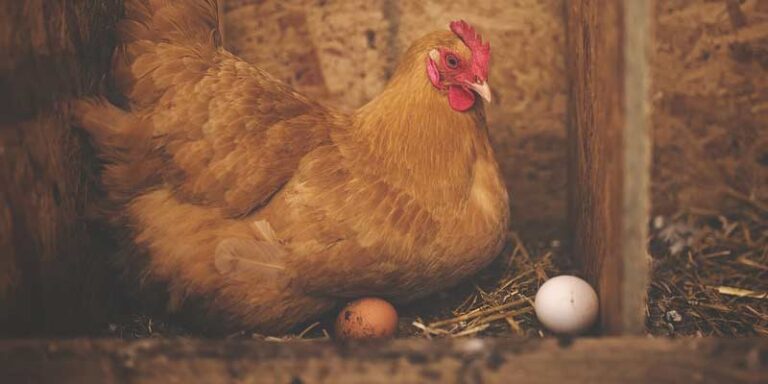If you are raising chickens for egg production, you may end up with a lot of questions, especially if this is your first time. For one, chickens will need nesting boxes to lay their eggs. Some people have different opinions on the number of nesting boxes for hens.
In this short article, we’ll go further in detail on how many nesting boxes your chicken need. Also, other related questions to the nesting boxes.
How Many Nest Boxing Per Chicken?
The number of nesting boxes will depend on the size of the flocks and breeds. While there is no hard or fast rule about how many nesting boxes you should have, typically it is 1 nesting box per 4-5 chickens.
You may ask yourself why so few nesting boxes? The reason is that chickens are social animals. Therefore, hens like to share their space with other hens when laying eggs.
If you have a lot of nesting boxes, you may find 2 or even 3 hens cluttering up together in one box.
Why Do Hens Need A Nesting Box?
When it comes to laying eggs, hens don’t actually need a nesting box. They can lay eggs outdoors or on the ground of the chicken coop.
However, a nesting box provides the hen with a safe location for laying eggs. For hens that are shy, it gives them privacy.
In addition, nesting boxes keep your hens from trying to lay eggs in a secluded corner of the coop or outdoors.
Another reason for a nesting box is to prevent the hens from trampling and damaging their eggs.
Why Might You Need More Nesting Boxes?
There are a couple of factors to determine if you will need more nesting boxes for your chickens.
One of the factors to consider is if all your chickens are laying eggs daily. If that’s the case, you’ll need more nesting boxes for them.
More nesting boxes will prevent them from being overcrowded. When there are too many hens and not enough boxes, it will cause them to be stressed. When chickens are stressed, they will lay fewer eggs or no eggs at all.
In addition, more nesting boxes will prevent eggs from breaking. A hen will lay an egg per day, but if there are a lot of hens, it will start to cause other problems.
When there are too many eggs, hens may start to egg their own eggs. Hens don’t often eat their own eggs, but if it breaks, they will. This is due to instinct to keep predators away.
In the wild, any eggs that break, the chickens will eat. The smell of the eggs will attract many predators to them and that could endanger their own lives.
Another thing you want to consider is the breed of chicken. Some breeds are very territorial over their nesting box. Not enough nesting boxes will cause them to fight each other all day long.
Problems From Having Too Few Nesting Boxes
If there are not enough nesting boxes in the coop, you may end up with a lot of problems.
One of the things that can happen is the chicken becoming stressed. A hen may not want to share a box with other hens, or if it’s too cramped, they may end up being stressed.
When a hen is stressed, it can become ill. This means they will stop eating and drinking, and will no longer lay any eggs.
Another thing that can happen is fighting among the hens. Hens don’t mind sharing nesting boxes with other hens, but if it gets too cramped, it may cause them to become frustrated. This will lead to fighting each other.
If you’ve ever witnessed hens fighting, it’s very aggressive. If you’re not around to break them up, they will end up injured or could even die from fighting.
The last thing that can happen is problems with laying eggs. Not only will the hens be stressed, but they will break their eggs and lay smaller eggs.
To prevent any of the above problems, make sure there are enough nesting boxes for your hens.
What To Put In Chicken Nesting Boxes?
A nesting box will usually have just the bedding in it. This will provide comfort for the hens to lay on and cushion the eggs.
While there is a lot of bedding available on the market, the one I recommended is pine shaving. They are easy to clean, cheap to buy, and easy to find in farm stores or online.
Besides pine shaving, straw and hay are fine to use as well. However, with this bedding, you will likely need to change the bedding frequently.
If you have problems with mites in your chicken coop, you can opt for cedar shavings. This material helps prevent mites and other pests from living in the bedding.
Also, you can use natural remedies and place herbs such as chives, lavender, and rosemary. Not only will it keep pests away, but it will also make the nesting box smell better. A herb such as lavender will help the hen relax and prompt laying.
Related Questions
Do nesting boxes need to be elevated?
The nesting boxes can be on the floor of the chicken coop or raised. When hens are laying eggs, they get startled easily which could cause them to become stressed.
To prevent that problem, you can raise the nesting boxes a little higher off the ground. This will make the hens feel safer and prompt egg laying than those on the ground.
How high should nesting boxes be off the ground?
The height of the nesting boxes from the ground should be between 18 and 24 inches. This is the height that will make it easy for the hens to reach them.


